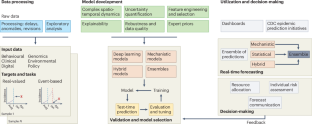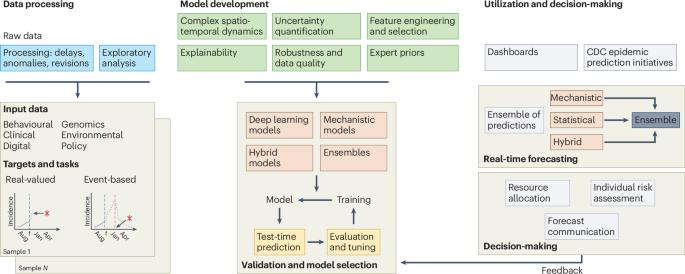以数据为中心的流行病预测机器学习
IF 18.8
1区 计算机科学
Q1 COMPUTER SCIENCE, ARTIFICIAL INTELLIGENCE
引用次数: 0
摘要
COVID-19 大流行强调了流行病预测对于从公共卫生到经济等多个领域的决策者的重要性。由于人类行为、病原体动态和环境条件等多种干扰因素的存在,预测流行病的发展是一项非同小可的任务。然而,公共卫生和资助机构的研究兴趣和举措激增,推动了新数据源的出现,这些数据源捕捉了疾病传播中以前无法观察到的方面,为一系列 "以数据为中心 "的计算解决方案铺平了道路,这些解决方案有望提高我们的预测能力。在此,我们将讨论各种方法论和实践方面的进展,并引入一个概念框架来指导这些进展。首先,我们列出了相关的数据集,如症状在线调查、零售和商业、流动性和基因组学数据。接下来,我们考虑了各种方法,重点是最近的数据驱动统计方法和基于深度学习的方法,以及将机理模型的领域知识与统计方法的灵活性相结合的混合模型。我们还讨论了在现实世界部署这些预测系统时出现的经验和挑战,包括根据预测做出决策。最后,我们强调了在整个预报流程中发现的一些挑战和未决问题,以确保未来大流行病的有力防备。本文章由计算机程序翻译,如有差异,请以英文原文为准。


Machine learning for data-centric epidemic forecasting
The COVID-19 pandemic emphasized the importance of epidemic forecasting for decision makers in multiple domains, ranging from public health to the economy. Forecasting epidemic progression is a non-trivial task due to multiple confounding factors, such as human behaviour, pathogen dynamics and environmental conditions. However, the surge in research interest and initiatives from public health and funding agencies has fuelled the availability of new data sources that capture previously unobservable aspects of disease spread, paving the way for a spate of ‘data-centred’ computational solutions that show promise for enhancing our forecasting capabilities. Here we discuss various methodological and practical advances and introduce a conceptual framework to navigate through them. First we list relevant datasets, such as symptomatic online surveys, retail and commerce, mobility and genomics data. Next we consider methods, focusing on recent data-driven statistical and deep learning-based methods, as well as hybrid models that combine domain knowledge of mechanistic models with the flexibility of statistical approaches. We also discuss experiences and challenges that arise in the real-world deployment of these forecasting systems, including decision-making informed by forecasts. Finally, we highlight some challenges and open problems found across the forecasting pipeline to enable robust future pandemic preparedness. Forecasting epidemic progression is a complex task influenced by various factors, including human behaviour, pathogen dynamics and environmental conditions. Rodríguez, Kamarthi and colleagues provide a review of machine learning methods for epidemic forecasting from a data-centric computational perspective.
求助全文
通过发布文献求助,成功后即可免费获取论文全文。
去求助
来源期刊

Nature Machine Intelligence
Multiple-
CiteScore
36.90
自引率
2.10%
发文量
127
期刊介绍:
Nature Machine Intelligence is a distinguished publication that presents original research and reviews on various topics in machine learning, robotics, and AI. Our focus extends beyond these fields, exploring their profound impact on other scientific disciplines, as well as societal and industrial aspects. We recognize limitless possibilities wherein machine intelligence can augment human capabilities and knowledge in domains like scientific exploration, healthcare, medical diagnostics, and the creation of safe and sustainable cities, transportation, and agriculture. Simultaneously, we acknowledge the emergence of ethical, social, and legal concerns due to the rapid pace of advancements.
To foster interdisciplinary discussions on these far-reaching implications, Nature Machine Intelligence serves as a platform for dialogue facilitated through Comments, News Features, News & Views articles, and Correspondence. Our goal is to encourage a comprehensive examination of these subjects.
Similar to all Nature-branded journals, Nature Machine Intelligence operates under the guidance of a team of skilled editors. We adhere to a fair and rigorous peer-review process, ensuring high standards of copy-editing and production, swift publication, and editorial independence.
 求助内容:
求助内容: 应助结果提醒方式:
应助结果提醒方式:


